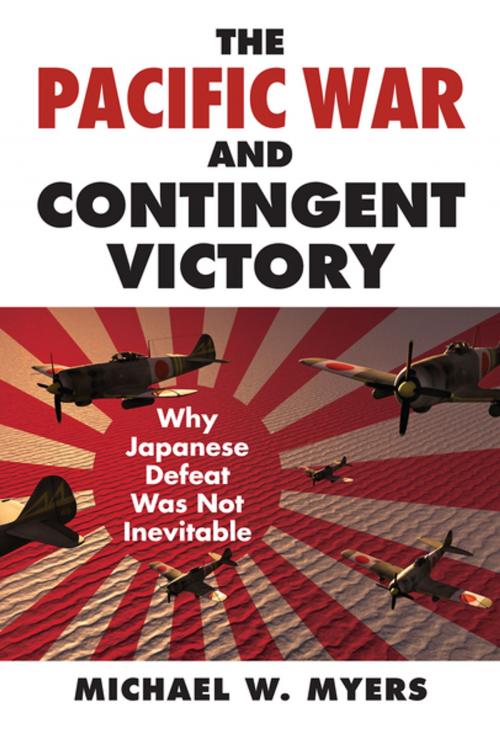The Pacific War and Contingent Victory
Why Japanese Defeat Was Not Inevitable
Nonfiction, History, Asian, Japan, Military, Strategy, World War II| Author: | Michael Myers | ISBN: | 9780700620883 |
| Publisher: | University Press of Kansas | Publication: | April 3, 2015 |
| Imprint: | University Press of Kansas | Language: | English |
| Author: | Michael Myers |
| ISBN: | 9780700620883 |
| Publisher: | University Press of Kansas |
| Publication: | April 3, 2015 |
| Imprint: | University Press of Kansas |
| Language: | English |
About the Allies' victory in the Pacific in WWII, it goes almost without question that Japan's defeat was inevitable in the face of overwhelming American military might and economic power. But the outcome, Michael W. Myers contends, was actually anything but inevitable. This book is Myers's thorough and deeply informed explanation of how contingent the "foregone conclusion" of the war in the Pacific really was.
However disproportionate their respective resources, both Japan and the Allied forces confronted significant obstacles to ultimate victory. One the two sides shared, Myers shows, was the lack of a single individual with the knowledge, vision, and authority to formulate and implement effective strategy. Both exercised leadership by committee, and Myers cogently explains how this contributed to the contingent nature of the conflict. A remarkable exercise in logical methods of strategic thinking, his book analyzes decisive campaigns in the Pacific War, examining the economic and strategic challenges that both sides faced and had to overcome to achieve victory. Japan, for instance, had two goals going into the war: to expand the boundaries of what they termed the "Greater East Asia Co-Prosperity Sphere" and to end their long and frustrating war in China. These goals, as Myers shows us, had unforeseen and devastating logistical and strategic consequences. But the United States faced similar problems—as well as other hurdles specific to a nation not yet on full war footing.
Overturning conventional historiography, The Pacific War and Contingent Victory clarifies the proper relationship between freedom and determinism in historical thinking. A compelling retelling of the Pacific war that might easily have been, the book offers historical lessons in thinking about contemporary American foreign policy and American exceptionalism—most saliently about the dangers of the presumption of American ascendancy.
About the Allies' victory in the Pacific in WWII, it goes almost without question that Japan's defeat was inevitable in the face of overwhelming American military might and economic power. But the outcome, Michael W. Myers contends, was actually anything but inevitable. This book is Myers's thorough and deeply informed explanation of how contingent the "foregone conclusion" of the war in the Pacific really was.
However disproportionate their respective resources, both Japan and the Allied forces confronted significant obstacles to ultimate victory. One the two sides shared, Myers shows, was the lack of a single individual with the knowledge, vision, and authority to formulate and implement effective strategy. Both exercised leadership by committee, and Myers cogently explains how this contributed to the contingent nature of the conflict. A remarkable exercise in logical methods of strategic thinking, his book analyzes decisive campaigns in the Pacific War, examining the economic and strategic challenges that both sides faced and had to overcome to achieve victory. Japan, for instance, had two goals going into the war: to expand the boundaries of what they termed the "Greater East Asia Co-Prosperity Sphere" and to end their long and frustrating war in China. These goals, as Myers shows us, had unforeseen and devastating logistical and strategic consequences. But the United States faced similar problems—as well as other hurdles specific to a nation not yet on full war footing.
Overturning conventional historiography, The Pacific War and Contingent Victory clarifies the proper relationship between freedom and determinism in historical thinking. A compelling retelling of the Pacific war that might easily have been, the book offers historical lessons in thinking about contemporary American foreign policy and American exceptionalism—most saliently about the dangers of the presumption of American ascendancy.















